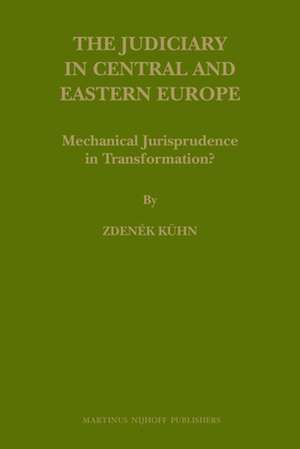The Judiciary in Central and Eastern Europe: Mechanical Jurisprudence in Transformation?: Law in Eastern Europe, cartea 61
Autor Zdenek Kühnen Limba Engleză Hardback – 27 oct 2011
Din seria Law in Eastern Europe
- 18%
 Preț: 897.58 lei
Preț: 897.58 lei -
 Preț: 392.37 lei
Preț: 392.37 lei -
 Preț: 393.74 lei
Preț: 393.74 lei - 5%
 Preț: 794.15 lei
Preț: 794.15 lei -
 Preț: 394.51 lei
Preț: 394.51 lei - 18%
 Preț: 1269.08 lei
Preț: 1269.08 lei - 18%
 Preț: 1201.34 lei
Preț: 1201.34 lei - 18%
 Preț: 1200.58 lei
Preț: 1200.58 lei - 18%
 Preț: 873.39 lei
Preț: 873.39 lei - 18%
 Preț: 873.61 lei
Preț: 873.61 lei - 18%
 Preț: 1544.04 lei
Preț: 1544.04 lei - 18%
 Preț: 956.13 lei
Preț: 956.13 lei - 18%
 Preț: 889.07 lei
Preț: 889.07 lei - 18%
 Preț: 1168.11 lei
Preț: 1168.11 lei - 18%
 Preț: 946.53 lei
Preț: 946.53 lei - 18%
 Preț: 1079.49 lei
Preț: 1079.49 lei - 18%
 Preț: 1080.63 lei
Preț: 1080.63 lei - 18%
 Preț: 749.09 lei
Preț: 749.09 lei - 18%
 Preț: 831.68 lei
Preț: 831.68 lei - 18%
 Preț: 675.72 lei
Preț: 675.72 lei - 18%
 Preț: 804.87 lei
Preț: 804.87 lei - 18%
 Preț: 1089.95 lei
Preț: 1089.95 lei - 18%
 Preț: 743.89 lei
Preț: 743.89 lei - 18%
 Preț: 753.78 lei
Preț: 753.78 lei
Preț: 852.24 lei
Preț vechi: 1039.32 lei
-18% Nou
Puncte Express: 1278
Preț estimativ în valută:
163.09€ • 169.31$ • 135.99£
163.09€ • 169.31$ • 135.99£
Carte indisponibilă temporar
Doresc să fiu notificat când acest titlu va fi disponibil:
Se trimite...
Preluare comenzi: 021 569.72.76
Specificații
ISBN-13: 9789004175563
ISBN-10: 9004175563
Pagini: 314
Dimensiuni: 160 x 240 x 23 mm
Greutate: 0.73 kg
Editura: Brill
Colecția Brill | Nijhoff
Seria Law in Eastern Europe
ISBN-10: 9004175563
Pagini: 314
Dimensiuni: 160 x 240 x 23 mm
Greutate: 0.73 kg
Editura: Brill
Colecția Brill | Nijhoff
Seria Law in Eastern Europe
Notă biografică
Zdeněk Kühn, Ph.D. (2001) in Law, Charles University; S.J.D. (2006) University of Michigan, is Associate Professor of Jurisprudence at Charles University and Judge of the Czech Supreme Administrative Court (2008). He has published extensively on legal interpretation and methodology.
Recenzii
"This superb book provides a convincing answer to the question of whether the fall of communism in eastern Europe has changed the way judges decide cases."; "I have seen no work of equal quality dealing with the Russian courts; thus I would highly recommend this book to Russian law specialists as well as to those interested in eastern Europe."
Slavic Review, 2012, p. 936, Peter B. Maggs, University of Illinois, Urbana-Champaign.
Slavic Review, 2012, p. 936, Peter B. Maggs, University of Illinois, Urbana-Champaign.
